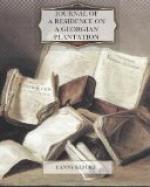Mr. —— lays great stress, as a proof of the natural inferiority of the blacks, on the little comparative progress they have made in those States where they enjoy their freedom, and the fact that, whatever quickness of parts they may exhibit while very young, on attaining maturity they invariably sink again into inferiority, or at least mediocrity, and indolence. But surely there are other causes to account for this besides natural deficiency, which must, I think, be obvious to any unprejudiced person observing the condition of the free blacks in your Northern communities. If, in the early portion of their life, they escape the contempt and derision of their white associates—if the blessed unconsciousness and ignorance of childhood keeps them for a few years unaware of the conventional proscription under which their whole race is placed (and it is difficult to walk your streets, and mark the tone of insolent superiority assumed by even the gutter-urchins over their dusky cotemporaries, and imagine this possible)—as soon as they acquire the first rudiments of knowledge, as soon as they begin to grow up and pass from infancy to youth, as soon as they cast the first observing glance upon the world by which they are surrounded, and the society of which, they are members, they must become conscious that they are marked as the Hebrew lepers of old, and are condemned to sit, like those unfortunates, without the gates of every human and social sympathy. From their own sable colour, a pall falls over the whole of God’s universe to them, and they find themselves stamped with a badge of infamy of Nature’s own devising, at sight of which all natural kindliness of man to man seems to recoil from them. They are not slaves indeed, but they are pariahs; debarred from all fellowship save with their own despised race—scorned by the lowest white ruffian in your streets, not tolerated as companions even by the foreign menials in your kitchen. They are free certainly, but they are also degraded, rejected, the offscum and the offscouring of the very dregs of your society; they are free from the chain, the whip, the enforced task and unpaid toil of slavery; but they are not the less under a ban. Their kinship with slaves for ever bars them from a full share of the freeman’s inheritance




